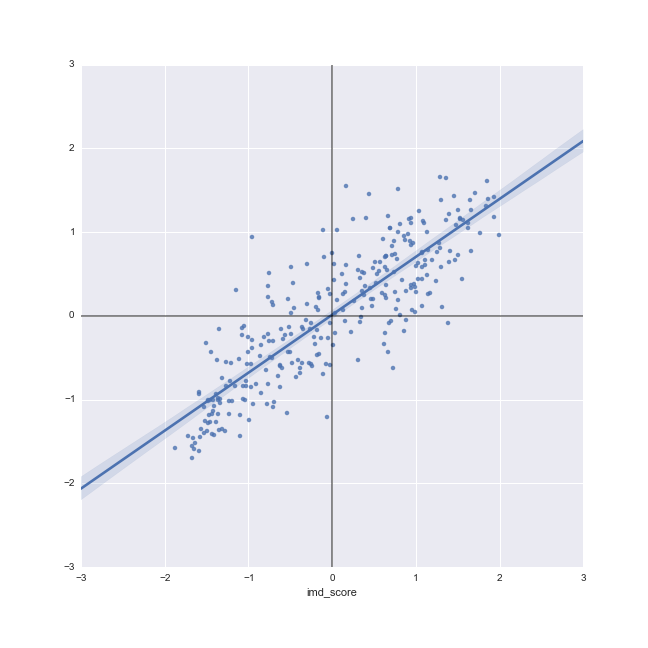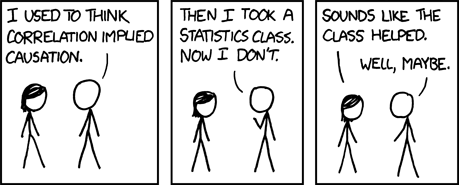Geographic Data Science - Lecture IX
Causal Inference
Dani Arribas-Bel
Today
- Correlation Vs Causation
- Causal inference
- Why/when causality matters
- Hurdles to causal inference & strategies to overcome them
Correlation Vs Causation
Correlation Vs Causation
Two fundamental ways to look at the relationship between two (or more) variables:
Correlation
Two variables have co-movement. If we know the value of one, we know something about the value of the other one.
Causation
There is a "cause-effect" link between the two and, as a result, they display co-movement.
Correlation Vs Causation
Both are useful, but for different purposes
Causation implies correlation but not the other way around
It is vital to keep this distinction in mind for meaningful and credible analysis
Examples
Sign correlation? Causal link?
Take a guess (2mins)...
- Temperature and ice-cream consumption → Positive. Positive.
- Non-commercial space launches & Sociology PhDs awarded
- Crime & policing
- IMD Moran Plot in Liverpool
[Source]
Examples
Positive or negative correlation? Causal link?
Take a guess (2mins)...
- Temperature and ice-cream consumption → Positive. Positive.
- Non-commercial space launches & Sociology PhDs awarded → Positive. None.
- Crime & policing → Positive. Negative.
- IMD Moran Plot in Liverpool
Examples
Positive or negative correlation? Causal link?
Take a guess (2mins)...
- Temperature and ice-cream consumption → Positive. Positive.
- Non-commercial space launches & Sociology PhDs awarded → Positive. None.
- Crime & policing → Positive. Negative.
- IMD Moran Plot in Liverpool → Positive. ?
Causal inference
Why/When get causal?
Why
- Most often, we are interested in understanding the processes that generate the world, not only in observing its outcomes
- Many of these processes are only indirectly observable through outcomes
- The only way to link both is through causal channels
When
Essentially when the core interest is to find out if something causes something else
- Policy interventions
- Medical trials
- Business decisions (product/feature development...)
- Empirical (Social) Sciences
- ...
When not (necessarily)
Exploratory analysis
When you are not sure what you are after, inferring causality might be too high of a price to pay to get a sense of the main relationships
Predictive settings
Interest not in understanding the underlying mechanisms but want to obtain best possible estimates of a variable you do not have by combining others you do have
E.g. Population density in a specific point using population density in all available nearby locations
Hurdles to causal inference
Hurdles to causal inference
Causation implies Correlation
Correlation does not imply Causation
Why?
- Reverse causality
- Confounding factors/endogeneity
Reverse causality
There is a causal link between the two variables but it either runs the oposite direction as we think, or runs in both
E.g. Education and income
Confounding factors
Two variables are correlated because they are both determined by other, unobserved, variables (factors) that confound the effect
E.g. Ice cream and cold beverages consumption
Strategies
Is there any way to overcome reverse causality and confounding factors to recover causal effects?
The key is to get an exogenous source of variation
Strategies
Randomized Control Trials
Treated and control groups
Probability of treatment is independent of everything else
Quasi-natural experiments
Like a RCT, but that just "happen to occur naturally" (natural dissasters, exogenous law changes...)
Econometric techniques
For the interested reader: space-time regression, instrumental variables, propensity score matching, differences-in-differences, regression discontinuity...
So, why correlation at all?
Establishing causality is much harder than identifying correlation, and sometimes it is just not possible with a given dataset (e.g. many observational surveys).
... correlation most often precludes causation and, depending on the application/analysis, it is all that is needed.
It is important to always draw conclusions based on analysis, know what the data can and cannot tell, and stay honest.
Recapitulation
- Correlation does NOT imply causation
- Causality implies more than correlation, a direct effect channel that is harder to identify but might be worthwhile
- There are several techniques to identify causality, all usually based on obtaining exogenous sources of variation
- You don't always need causality


Geographic Data Science'16 - Lecture 9 by Dani Arribas-Bel is licensed under a Creative Commons Attribution-NonCommercial-ShareAlike 4.0 International License.